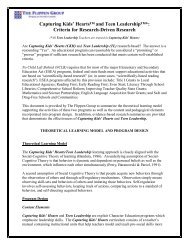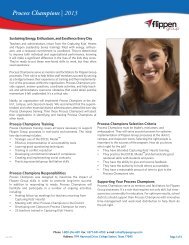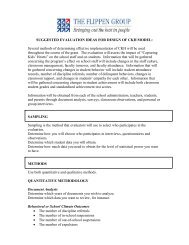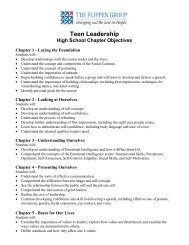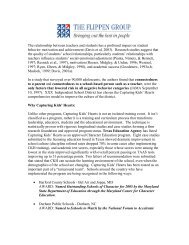Smart & Good High Schools - The Flippen Group
Smart & Good High Schools - The Flippen Group
Smart & Good High Schools - The Flippen Group
- No tags were found...
You also want an ePaper? Increase the reach of your titles
YUMPU automatically turns print PDFs into web optimized ePapers that Google loves.
CHAPTER 2: Performance Character and Moral Characterenjoyment of their own fields of work; and (6) were morelikely to experience “flow,” the experience of optimalengagement as they exercised and developed their talents.8 (See Flow: <strong>The</strong> Psychology of Optimal Experience, forCsikszentmihalyi’s elaboration of the concept of flow 9 .)Teens who develop their talents do sothrough performance character.In short, the combination of strong performance character,supportive and challenging adults, and the capacity totake pleasure in developing their gifts maximized the likelihoodthat talented teens fulfilled their potential.2. <strong>The</strong> wisdom of the ages. Washington State University historianRichard Hooker notes that the most articulatedvalue in Greek culture is arête, a word frequently translatedas “virtue,” which Hooker claims is actually bettertranslated as “being the best you can be” or “reachingyour highest human potential.” 10 This notion of virtueindicates support for a view of character rooted in excellenceand ethics. <strong>The</strong> wisdom of the ages confirms thenecessity and power of both performance character andmoral character, as the box on page 24 shows.3. Lives of character. If we examine lives of character, weinvariably find both strong performance character andstrong moral character at work. In their book, Some DoCare: Contemporary Lives of Moral Commitment, psychologistsAnne Colby and William Damon profile 23 men andwomen of exemplary character, including religious leadersof different faiths, businessmen, physicians, teachers,heads of nonprofit organizations, and leaders of socialmovements. 11 <strong>The</strong>ir contributions spanned civil rights, thefight against poverty, medical care, education, philanthropy,the environment, peace, and religious freedom.Reading these portraits of character, one sees again andagain, the interplay of moral character and performancecharacter: high ethical goals combined with diligence anddetermination in the pursuit of those goals. Colby’s andDamon’s book could have been titled, Some Do Care—AndThose Who Care Most Effectively Are Very <strong>Good</strong> At What <strong>The</strong>yDo. None of the noble accomplishments of these exemplarswould have been possible without the mutually supportivecontributions of performance character andmoral character. And so it is, we suggest, in any life ofcharacter.4. <strong>The</strong> practices of great character educators. If we examinehow great teachers or great coaches go about their craft,we find that they foster in their students both performancecharacter and moral character—a commitment toboth excellence and ethics. As a case in point, considerthe legendary UCLA basketball coach, John Wooden. Inthe twelve seasons from 1964 to 1975, Wooden’s men’sUCLA basketball teams won ten NCAA Division I championships,including seven national championships in arow. No other coach—in basketball or any other sport—has matched such a record of excellence. And yet Woodennever talked to his players about winning; he talkedabout character. <strong>The</strong> character blueprint for UCLA’ssupremacy was Wooden’s famous “Pyramid of Success”(figure, page 26), consisting of 25 values which he explicitlytaught to his teams and which they, under his direction,consistently practiced (www.coachjohnwooden.com/index.html).Note that these values included moral values, such asfriendship, loyalty, cooperation, honesty, and reliability,as well as performance values, such as industriousness,enthusiasm, skill, team spirit, and competitivegreatness. <strong>The</strong>se values in action, not good recruitingor good fortune, were the distinguishing mark ofUCLA basketball teams and the secret of their remarkablesuccess.In his memoir, Wooden wrote:<strong>The</strong> goal in life is the same as in basketball: Make theeffort to do the best you are capable of doing—in marriage,at your job, in the community, for your country.Make the effort to contribute in whatever way you can.You may do it materially or with time, ideas, or work.Making the effort to contribute is what counts. <strong>The</strong>effort is what counts in everything. 1225<strong>Smart</strong> & <strong>Good</strong> <strong>High</strong> <strong>Schools</strong>




